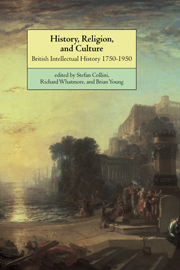Book contents
- Frontmatter
- Contents
- Preface
- General introduction
- Presentation of History, Religion, and Culture
- Part I
- Part II
- Part III
- 8 The politics of anatomy and an anatomy of politics c. 1825–1850
- 9 Images of time: from Carlylean Vulcanism to sedimentary gradualism
- 10 ‘Race’ and ‘nation’ in mid-Victorian thought
- 11 Political thought and national identity in Britain, 1850–1950
- List of contributors
- Acknowledgements
- Index
8 - The politics of anatomy and an anatomy of politics c. 1825–1850
Published online by Cambridge University Press: 03 December 2009
- Frontmatter
- Contents
- Preface
- General introduction
- Presentation of History, Religion, and Culture
- Part I
- Part II
- Part III
- 8 The politics of anatomy and an anatomy of politics c. 1825–1850
- 9 Images of time: from Carlylean Vulcanism to sedimentary gradualism
- 10 ‘Race’ and ‘nation’ in mid-Victorian thought
- 11 Political thought and national identity in Britain, 1850–1950
- List of contributors
- Acknowledgements
- Index
Summary
Historians of nineteenth-century science have made remarkable advances during the last twenty years, yet their findings have largely been ignored by political and intellectual historians. In seeking to explain why this should be so, it might seem unfair to scapegoat one of the few books which, forty years ago, seriously attempted to make the necessary integration. Nevertheless, the critical success of 1859: Entering an Age of Crisis possibly did more harm than good. Its premise was that On the Origin of Species (1859) had been a ‘seminal volume’. ‘The first edition was bought up in a single day, and there followed … convulsions of the national mind … Here, evidently, is crisis.’ Charles Darwin's book was shocking because ‘a great chasm seemed to have been opened between God and Nature … It seemed to many … that God had been banished from the world.’ The consequence was ‘crisis’ – in politics, economics, international affairs, metaphysics, and literary criticism. One of the contributors, H. M. Jones, clearly had doubts about this premise, pointing out that the ‘formation’ of the Liberal Party in 1859 hardly amounted to ‘crisis’, and that John Stuart Mill's On Liberty, published in the same year, was one of ‘the great expressions of utopian hope’, since it envisaged a perfect world of amiable and rational public discussion. But having made his point, even Jones jumped back into line. ‘Still, the idea of crisis will not down … In the sense that Mill looked forward to a perfection that never took shape, one can regard his great essay as a gateway into crisis.’
- Type
- Chapter
- Information
- History, Religion, and CultureBritish Intellectual History 1750–1950, pp. 179 - 197Publisher: Cambridge University PressPrint publication year: 2000
- 5
- Cited by

